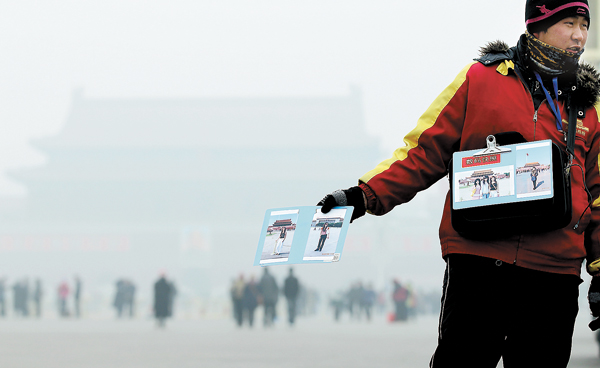'Joint effort' urged to clear the air
 0 Comment(s)
0 Comment(s) Print
Print E-mail China Daily, January 30, 2013
E-mail China Daily, January 30, 2013
Thick smog and haze shrouded large areas of China on Tuesday for the fourth time this month, again provoking heated discussions over government measures that seem ineffective.
But tackling air pollution requires input from individuals as well as officials, experts say, though an environmental NGO points the finger at the economic structure.
 |
|
The clear sky over Tian'anmen Square, depicted in a photographer's work, is in sharp contrast to conditions on Tuesday. [China Daily] |
The air pollution covered an area of 1.3 million sq km in central and eastern areas on Tuesday, including Beijing and Hebei, Shandong, Shanxi and Jiangsu provinces, according to the Satellite Environment Center of the Environmental Protection Ministry.
In a recent survey of 7,000 people from 31 provinces, conducted by China Youth Daily, more than 90 percent of respondents believed that air pollution had a major effect on their lives.
About 85 percent of respondents expected emergency plans to be initiated by the government but only about half felt that they could take measures themselves to improve air quality.
Xiao Yan believes that individuals can play a role in combating pollution. The 30-year-old lawyer in Beijing uses public transportation when going out, instead of driving or taking a taxi.
She said she learned about how much individuals can tackle sources of PM2.5 — particulate matter smaller than 2.5 microns in diameter that can enter the lungs and bloodstream — through using buses and trains on an NGO's website.
"Vehicle emissions are not much less than those from industry," Xiao said. "Using public transportation may be inconvenient, but it is worth it."
But her low-carbon lifestyle is not appreciated by her colleagues and friends. Some even mock her.
"Everyone is responsible for creating air pollution. No one will act if we all just place our hopes in others," said Du Shaozhong, director of the China Beijing Environment Exchange.
He said when it comes to policies, such as vehicle controls, there is always resistance from the public because no one wants to give up their rights.
Vehicle emissions have replaced industrial pollution as the biggest contributor to airborne pollution in major Chinese cities, according to research by Zhuang Guoshun, a professor at Fudan University's Atmospheric Chemistry Research Center.
Wu Xiaoqing, vice-minister of the Environmental Protection Ministry, has also emphasized the growing importance of pollution from vehicles.
But in a recent online survey conducted by China Auto Market Magazine, more than 60 percent of the 4,000 participants did not agree with the policy to charge congestion fees.





